Syria.......
 Russia had been pushing for Iran’s inclusion in the talks for months, and UN Secretary General Ban Ki-moon offered the last second invitation more or less out of the blue yesterday, leading to furious US State Department reactions and a threat from what few Syria rebels were planning to attend in the first place to withdraw if Iran wasn’t uninvited by 2 pm today.
Russia had been pushing for Iran’s inclusion in the talks for months, and UN Secretary General Ban Ki-moon offered the last second invitation more or less out of the blue yesterday, leading to furious US State Department reactions and a threat from what few Syria rebels were planning to attend in the first place to withdraw if Iran wasn’t uninvited by 2 pm today.
 U.N. Secretary-General Ban Ki-moon on Jan. 20 withdrew an offer for Iran to attend Syria peace negotiations after Tehran declared it does not support the June 2012 political transition deal that is the basis for the talks.
U.N. Secretary-General Ban Ki-moon on Jan. 20 withdrew an offer for Iran to attend Syria peace negotiations after Tehran declared it does not support the June 2012 political transition deal that is the basis for the talks.
"He (Ban) continues to urge Iran to join the global consensus behind the Geneva communiqué," Ban's spokesman Martin Nesirky said. "Given that it has chosen to remain outside that basic understanding, (Ban) has decided that the one-day Montreux gathering will proceed without Iran's participation."
Ban said earlier that Iran's public statement that it did not support the 2012 Geneva deal calling for a transitional government for Syria was "not consistent" with assurances he had been given by Iran's Foreign Minister Mohammad Javad Zarif.
Earlier, Syria's main Western-backed opposition group gave an ultimatum, saying Iranmust commit publicly by 1900 GMT to withdraw its "troops and militias" from Syria and abide by those terms, or the U.N. should withdraw the invitation.
"By 1900 GMT, they have to confirm that Iran is not invited to the conference or we will not attend," said Hadi AlBahra earlier Jan. 20, insisting that Iran's participation at the talks was "impossible".
Iran announced it had accepted an invitation by United Nations Secretary-General to attend talks due to start on Jan. 22 in Geneva aimed at ending Syria's civil war, the student news agency ISNA reported.
"We have always rejected any precondition for attending the Geneva 2 meeting on Syria ... Based on the official invitation that we have received, Iran will attend the Geneva 2 without any preconditions," ISNA quoted Foreign Ministry spokeswoman Marzieh Afkham as saying.
Western powers have so far opposed Iran’s presence on the grounds that it had not accepted a communiqué adopted by major powers in Geneva in June 2012 calling for the creation of an interim government.
Regional powerhouse Saudi Arabia, which supports the Syrian rebels, also rejected Iran’s participation, saying it was “unqualified to attend.”
The accord at the so-called Geneva I talks made no mention of al-Assad’s departure, something the Syrian opposition says is non-negotiable. But Russia, another Damascus ally and its biggest weapons’ supplier, said Tehran’s absence would be a “unforgivable mistake.”
Ban’s initial invitation came after Tehran vowed to play a “very positive and constructive role” in peace efforts.
 The announcement was immediately condemned by what few Syrian opposition factions had agreed to attend, and they are now threatening to withdraw from the talks unless Iran is barred.
The announcement was immediately condemned by what few Syrian opposition factions had agreed to attend, and they are now threatening to withdraw from the talks unless Iran is barred.
 The fighting began weeks ago, when the Islamic Front and Free Syrian Army (FSA) launched strikes against AQI’s outlying territories in Idlib, seizing several of their less well-guarded possessions. Since then the fighting has spanned the whole rebel region, killing many hundreds of fighters.
The fighting began weeks ago, when the Islamic Front and Free Syrian Army (FSA) launched strikes against AQI’s outlying territories in Idlib, seizing several of their less well-guarded possessions. Since then the fighting has spanned the whole rebel region, killing many hundreds of fighters.
http://news.antiwar.com/2014/01/19/major-syria-rebels-spurn-geneva-2-but-small-faction-will-attend/
 The SNC are the first rebel-linked group to agree to attend Geneva 2, and by all accounts are going to be the only one, with the much larger Islamic Front rejecting the talks as a “hollow” process.
The SNC are the first rebel-linked group to agree to attend Geneva 2, and by all accounts are going to be the only one, with the much larger Islamic Front rejecting the talks as a “hollow” process.
From Lebanon's Daily Star .....
Syria warplanes bomb Aleppo, killing 34: activistsJanuary 18, 2014 08:14 PM (Last updated: January 18, 2014 11:57 PM)
BEIRUT: Government warplanes on Saturday launched raids on the northern Syrian city of Aleppo and the surrounding countryside, killing 34 people, including five children, the Syrian Observatory for Human Rights said.
Air raids launched by government jets and helicopters left 23 people dead in the city itself, and killed another 11 in the surrounding countryside, the Observatory reported.
It said five of those killed in Saturday's bombing were children.
"Warplanes bombed areas in the neighbourhoods of Tariq al-Bab and Karam al-Jabal in Aleppo," as well as the city's Sukhur district, said the Britain-based monitoring group which relies on a network of activists on the ground for its reports.
The areas are controlled by opposition fighters who have been battling forces loyal to the government of President Bashar al-Assad since they launched a major offensive in the city in the summer of 2012.
The Observatory also said "helicopters dropped explosive-packed barrels on Al-Bab town (east of Aleppo) that led to the death of several fighters from the (jihadist) Islamic State of Iraq and Greater Syria, leaving an unknown number of people wounded.
Helicopters also launched raids with "barrel bombs" on other areas of the northern city, once Syria's commercial capital, and two Villages in the south of Aleppo province, said the Observatory without giving further details on casualties.
In December, regime warplanes launched a series of raids with the powerful barrel bombs in Aleppo province, killing more than 500 people in nearly two weeks.
Elsewhere in the country, government jets pounded two areas east of the capital Damascus in eight raids, the Observatory reported, without saying whether there had been any casualties in the attacks.
Meanwhile, the Observatory said that clashes raged between ISIS and rival rebel groups in Aleppo province on Saturday.
Fighters from groups battling the jihadist ISIS seized a Village in the province, but lost ground to the other rebels in the town of Manbaj, according to the Observatory.
Nine members of one rebel group taking part in the battle against ISIS were killed early on Saturday, the Observatory reported, when a car bomb went off at a checkpoint they were manning in rural Aleppo.
Ban hails Syria opposition accord on peace talksJanuary 19, 2014 04:16 PM
UNITED NATIONS:- UN leader Ban Ki-moon on Sunday hailed the Syrian opposition's decision to join an international peace conference this week as a boost to efforts to halt the Syrian war.
"This is a courageous and historic step in the interest of a negotiated political solution to a three-year conflict that has caused so much misery and destruction," Ban said in a statement.
"I look forward to the opposition's expedited formation of a delegation that broadly represents the diversity of the Syrian opposition, including women," added the UN leader, who is the convenor of the conference that will start in the Swiss town of Montreux on Wednesday.
The Syrian National Coalition voted on Saturday to attend the conference that could see its representatives hold talks with President Bashar al Assad's government for the first time.
In welcoming the vote, Ban highlighted that the aim of the conference is "to reach agreement between the Syrian sides on the full implementation of the Geneva Communique of June 30, 2012 and to achieve a political transition that would bring to an end the suffering of the Syrian people."
The major powers and key Middle East nations met in Geneva in June 2012 to agree on a statement which said that there should be a transitional government in Syria with full executive powers.
Ban has invited 30 countries and a group of regional bodies to the meeting that will start in Montreux before a one day break and then a resumption of talks in Geneva.
From Russia Today.....
Iraq.....
http://www.thenational.ae/world/iraq/numbers-of-militants-increase-in-fallujah
BAGHDAD // Al Qaeda and other insurgent groups have tightened their grip on Fallujah, defying the Shiite-led Iraqi government’s efforts to persuade local tribesmen to expel them from the Sunni Muslim city, residents and officials say.
Despite an army siege, fighters and weapons have been flowing into the city, where United States troops fought some of their fiercest battles during their 2003-11 occupation of Iraq.
In an embarrassing setback for a state that has around a million men under arms, the Al Qaeda-linked Islamic State of Iraq and the Levant (Isil) and its tribal allies overran Fallujah and parts of the nearby city Ramadi on January 1.
Iraq’s prime minister Nouri Al Maliki, who is seeking a third term in a parliamentary election in April, deployed troops and tanks around the city of 300,000 and funnelled weapons to anti-Al Qaeda tribesmen but has ruled out a full-scale military assault.
Ramadi, the provincial capital of the vast western province of Anbar, is mostly back under state control, but Mr Al Maliki’s calls on local tribesmen to evict the militants from Fallujah, just 50 kilometres west of Baghdad, have so far come to nought.
Instead, scores more fighters have sneaked into the city along with an array of weaponry ranging from small arms and mortars to Grad missiles and anti-aircraft guns, according to security and local officials, residents and tribal leaders.
“Our sources in Fallujah indicate that militant numbers have increased to more than 400 in the last few days and that more anti-aircraft guns were received,” said a senior local official who declined to be named. His figure could not be confirmed.
The weapons and fighters are reaching Fallujah mainly from its southern environs, an area entirely under the sway of tribes hostile to the government, security officials said.
“The tribes scattered around Fallujah have zero loyalty to the central government,” said Sheikh Mohammed Al Bajari, a tribal leader and negotiator in the city.
“Now they (the army) are not controlling anything and no roads can be closed,” he said of Fallujah’s southern approaches.
The Al Qaeda-linked militants, which are also playing an aggressive role in Syria’s civil war, are greatly outnumbered by armed tribesmen in Fallujah, a symbol of Sunni identity and resistance in Iraq, many of whom lean towards the militants or other insurgent factions.
Since the city fell out of government control, various rebel groups have loosely aligned with the militants or are asserting their own influence, officials, tribal leaders and residents said.
These include Islamist factions such as the 1920 Revolution Brigades, the Islamic Army, the Mujahedin Army, the Rashidin Army and Ansar Al Sunna, as well as the Army of the Men of the Naqshbandi Order, a Baathist militia created by Izzat Al Duri, a former lieutenant of Iraq’s deposed leader Saddam Hussein.
Despite its limited numbers, Isil dominates by its zeal and fearsome reputation on and off the battlefield, frequently using suicide bombers in Iraq and in Syria — where it has even turned them on rival rebel factions in a bitter power struggle.
http://www.marinecorpstimes.com/article/20140117/NEWS/301170009/U-S-troops-may-return-Middle-East-train-Iraqis

Iraqi forces launched a major assault Sunday on a Sunni Arab city partially in the control of anti-government fighters in a bid to end a weeks-long crisis ahead of elections.
The operation, which involved police, pro-government militiamen and SWAT forces, sought to wrest back key neighbourhoods of Ramadi, the capital of Anbar province and one of two cities where the authorities lost vast swathes of territory about three weeks ago.
It came as Jordan said it would host a US training programme for Iraqi forces grappling with the country's worst bloodshed since 2008 and the ongoing standoff in Anbar, which, combined, have left more than 650 people dead this month.
Diplomats including UN chief Ban Ki-moon have urged Baghdad to pursue political reconciliation to undercut support for militancy.
But with an election looming in April, Iraqi premier Nuri al-Maliki has blamed "diabolical" Arab countries for the unrest and focused on security operations.
Iraqi forces backed by tribesmen moved into five Ramadi neighbourhoods Sunday, with helicopters providing cover and firing on the sprawling district of Malaab at the centre of fighting between anti-government fighters and security forces and their tribal allies.
"The Iraqi army launched a large operation with helicopter cover against Daash, Al-Qaeda and terrorists in Ramadi," defence ministry spokesman Staff Lieutenant General Mohammed al-Askari said, according to state television, employing terms frequently used by the Iraqi security forces to describe militants.
Security forces barred movement in the city as part of the operation, which targeted neighbourhoods in the south and centre of Ramadi.
The operation will seek to take back momentum from anti-government fighters, who have expanded their hold on Ramadi in the past week after police and allied tribesmen trumpeted gains there this month.
It follows an operation mounted by elite forces in the largely rural area of Albubali that security officials have described as a militant stronghold.
Troops there have been held back, however, by the threat of snipers and anti-aircraft weapons, as well as poor weather that has limited movement.
A large section of Ramadi and all of Fallujah, both former insurgent bastions close to Baghdad, fell from government control late last month.
It was the first time anti-government fighters have exercised such open control in major cities since the height of the insurgency that followed the US-led invasion of 2003.
Fighting originally erupted in the Ramadi area on December 30, when security forces cleared a year-old Sunni Arab protest camp.
It spread to Fallujah, and militants moved in and seized the city and parts of Ramadi after security forces withdrew.
Maliki on Sunday blamed "diabolical" and "treacherous" Arab countries for supporting the unrest, and insisted he was "confident that the Iraqi people will defeat terrorism".
"The world has united with us," he said in a speech in the southern city of Nasiriyah. "The (UN) Security Council, the European Union, and most Arab countries, except some diabolical treacherous countries." He did not single out specific countries, but Iraqi officials have alleged Saudi Arabia and Qatar in particular have supported disaffectedSunni Arabs in western Iraq as they have staged anti-government protests in the past year.
Amman meanwhile said on Sunday it would host US training for Iraqi forces, after anAmerican defence official said Washington was waiting for an agreement with Jordan or another country to go ahead with the programme.
Maliki told The Washington Post in an interview published on Thursday that Baghdad specifically needed US "counter-terrorism" training.
The US defence official said Washington was also preparing to ship "several thousand" M-16 and M-4 assault rifles as well as ammunition to Iraq, after having already provided missiles to Maliki's government.
Violence also struck elsewhere in Iraq on Sunday, with nine people killed in restive cities north of Baghdad, a day after a wave of bombings in the capital killed 25.
Among the dead were six pro-government Sunni militiamen gunned down in an early morning attack on their checkpoint near the confessionally-mixed city of Baquba. Attacks in the predominantly Sunni cities of Mosul and Tikrit left three others dead.
More than 650 people have been killed already this month, according to an AFP tally, part of a protracted surge in unrest nationwide.
Facing US Complains, UN Uninvites Iran to Syria Talks
UN Officials Feign Anger at Iran After Giving in to US Pressure
by Jason Ditz, January 20, 2014
Facing growing US anger, the United Nations has done a complete about-face on yesterday’s invitation for Iran to attend the Geneva talks. The UN has now officially uninvited Iran.
 Russia had been pushing for Iran’s inclusion in the talks for months, and UN Secretary General Ban Ki-moon offered the last second invitation more or less out of the blue yesterday, leading to furious US State Department reactions and a threat from what few Syria rebels were planning to attend in the first place to withdraw if Iran wasn’t uninvited by 2 pm today.
Russia had been pushing for Iran’s inclusion in the talks for months, and UN Secretary General Ban Ki-moon offered the last second invitation more or less out of the blue yesterday, leading to furious US State Department reactions and a threat from what few Syria rebels were planning to attend in the first place to withdraw if Iran wasn’t uninvited by 2 pm today.
The UN, apparently unwilling to live with the egg that’s plainly on their face after the past 24 hours, followed up their uninvitation with an feigned condemnation of Iran for refusing to endorse the US calls for regime change in Syria.
Iran had never suggested they were going to accept the US calls in the first place, and that was a chief reason the US opposed their invitation, insisting that the only people who could attend the talks were those who had accepted regime change as the goal, and also the Syrian government itself and Russia, who both oppose the plan.
It isn’t clear if the UN met the 2 pm deadline imposed by the rebels, and this could well give them an excuse to withdraw from the talks at the last minute, since they were never keen on attending in the first place. The talks are not expected to accomplish much of anything, with the US and friends insisting the goal is regime change and the Assad government suggesting that maybe the growing takeover of al-Qaeda was also worth discussing.
UN chief Ban Ki-moon withdraws Iran's invitation to Syria talks

UN Secretary-General Ban Ki-moon makes an announcement at the United Nations headquarters in New York, Jan. 19. AFP photo
"He (Ban) continues to urge Iran to join the global consensus behind the Geneva communiqué," Ban's spokesman Martin Nesirky said. "Given that it has chosen to remain outside that basic understanding, (Ban) has decided that the one-day Montreux gathering will proceed without Iran's participation."
Ban said earlier that Iran's public statement that it did not support the 2012 Geneva deal calling for a transitional government for Syria was "not consistent" with assurances he had been given by Iran's Foreign Minister Mohammad Javad Zarif.
Earlier, Syria's main Western-backed opposition group gave an ultimatum, saying Iranmust commit publicly by 1900 GMT to withdraw its "troops and militias" from Syria and abide by those terms, or the U.N. should withdraw the invitation.
"By 1900 GMT, they have to confirm that Iran is not invited to the conference or we will not attend," said Hadi AlBahra earlier Jan. 20, insisting that Iran's participation at the talks was "impossible".
Iran announced it had accepted an invitation by United Nations Secretary-General to attend talks due to start on Jan. 22 in Geneva aimed at ending Syria's civil war, the student news agency ISNA reported.
"We have always rejected any precondition for attending the Geneva 2 meeting on Syria ... Based on the official invitation that we have received, Iran will attend the Geneva 2 without any preconditions," ISNA quoted Foreign Ministry spokeswoman Marzieh Afkham as saying.
Western powers have so far opposed Iran’s presence on the grounds that it had not accepted a communiqué adopted by major powers in Geneva in June 2012 calling for the creation of an interim government.
Regional powerhouse Saudi Arabia, which supports the Syrian rebels, also rejected Iran’s participation, saying it was “unqualified to attend.”
The accord at the so-called Geneva I talks made no mention of al-Assad’s departure, something the Syrian opposition says is non-negotiable. But Russia, another Damascus ally and its biggest weapons’ supplier, said Tehran’s absence would be a “unforgivable mistake.”
Ban’s initial invitation came after Tehran vowed to play a “very positive and constructive role” in peace efforts.
January/20/2014
UN Invites Iran to Syria Talks, Angering Opposition and US
State Dept Demands Invitation Be Rescinded
by Jason Ditz, January 19, 2014
UN Secretary General Ban Ki-moon took everyone by surprise today with a last second invitation for Iran to attend the Geneva 2 peace talks on Syria. Russia had been backing an invitation for Iran for months, over US objections.
 The announcement was immediately condemned by what few Syrian opposition factions had agreed to attend, and they are now threatening to withdraw from the talks unless Iran is barred.
The announcement was immediately condemned by what few Syrian opposition factions had agreed to attend, and they are now threatening to withdraw from the talks unless Iran is barred.
The US State Department also demanded that the invitation be immediately rescinded, saying Iran could only be allowed to attend if they agreed to regime change before the conference began.
Secretary of State John Kerry had previously ruled out inviting Iran, saying their support for Assad made them a “major actor” in the civil war. Large numbers of other Middle East nations openly backing the rebels have been invited, however.
Al-Qaeda Urges Rival Syrian Rebels to Stop Infighting
Says Groups Should Get Back to Fighting Civil War
by Jason Ditz, January 19, 2014
With the ongoing “war within a war” infighting between al-Qaeda in Iraq (AQI) and other Syrian rebel factions spanning four provinces and largely eclipsing the nation’s civil war itself, AQI is issuing a call for rapprochement among rebel factions.
 The fighting began weeks ago, when the Islamic Front and Free Syrian Army (FSA) launched strikes against AQI’s outlying territories in Idlib, seizing several of their less well-guarded possessions. Since then the fighting has spanned the whole rebel region, killing many hundreds of fighters.
The fighting began weeks ago, when the Islamic Front and Free Syrian Army (FSA) launched strikes against AQI’s outlying territories in Idlib, seizing several of their less well-guarded possessions. Since then the fighting has spanned the whole rebel region, killing many hundreds of fighters.
The AQI statement, issued as an audio recording from Abu Bakr al-Baghdadi, urged other rebels to join hands and focus on fighting the Assad government, saying it was vital to “refrain from attacking each other.”
AQI had recently been on the counter-offensive against the other rebels, retaking much of their lost territory and executing large numbers of rivals. The group seems to be hoping they can get some sort of arrangement going now before the momentum turns against them again.
http://news.antiwar.com/2014/01/19/major-syria-rebels-spurn-geneva-2-but-small-faction-will-attend/
Major Syria Rebels Spurn Geneva 2, But Small Faction Will Attend
Self-Proclaimed Government-in-Exile to Send Delegation
by Jason Ditz, January 19, 2014
Faced with intense pressure from Western nations, the Syrian National Coalition (SNC), the nation’s self-proclaimed “government-in-exile,” has finally agreed to send a delegation to this week’s Geneva 2 peace talks. The delegation is said to include “representation” from several smaller rebel factions.
 The SNC are the first rebel-linked group to agree to attend Geneva 2, and by all accounts are going to be the only one, with the much larger Islamic Front rejecting the talks as a “hollow” process.
The SNC are the first rebel-linked group to agree to attend Geneva 2, and by all accounts are going to be the only one, with the much larger Islamic Front rejecting the talks as a “hollow” process.
The Islamic Front would’ve been a much more meaningful addition to the talks, as the largest rebel faction that isn’t formally part of al-Qaeda (though their informal links are becoming more public).
Several Western nations have been courting the Islamic Front as a potential replacement for the SNC’s fighting force, the Free Syrian Army (FSA), which has lost much of its territory and is quickly becoming irrelevant on the ground. Neither of the major al-Qaeda factions was invited to the talks.
Early last week, US officials indicated Geneva 2 might seek some regional ceasefires, especially in Aleppo, but after the Syrian government openly endorsed the idea Secretary of State John Kerry changed positions, and is now vowing that the conference will end with an agreement on regime change.
The Geneva 2 talks were initially announced for June of last year, but were repeatedly delayed over lack of rebel interest. The conference begins later this week in Montreaux.
From Lebanon's Daily Star .....
Syria warplanes bomb Aleppo, killing 34: activistsJanuary 18, 2014 08:14 PM (Last updated: January 18, 2014 11:57 PM)
 |
 |
| The remains of a mortar are seen in a street of the Syrian city of Daraya, southwest of the capital Damascus, on January 17, 2014. AFP PHOTO / FADI DIRANI |
 |  |
BEIRUT: Government warplanes on Saturday launched raids on the northern Syrian city of Aleppo and the surrounding countryside, killing 34 people, including five children, the Syrian Observatory for Human Rights said.
Air raids launched by government jets and helicopters left 23 people dead in the city itself, and killed another 11 in the surrounding countryside, the Observatory reported.
It said five of those killed in Saturday's bombing were children.
"Warplanes bombed areas in the neighbourhoods of Tariq al-Bab and Karam al-Jabal in Aleppo," as well as the city's Sukhur district, said the Britain-based monitoring group which relies on a network of activists on the ground for its reports.
The areas are controlled by opposition fighters who have been battling forces loyal to the government of President Bashar al-Assad since they launched a major offensive in the city in the summer of 2012.
The Observatory also said "helicopters dropped explosive-packed barrels on Al-Bab town (east of Aleppo) that led to the death of several fighters from the (jihadist) Islamic State of Iraq and Greater Syria, leaving an unknown number of people wounded.
Helicopters also launched raids with "barrel bombs" on other areas of the northern city, once Syria's commercial capital, and two Villages in the south of Aleppo province, said the Observatory without giving further details on casualties.
In December, regime warplanes launched a series of raids with the powerful barrel bombs in Aleppo province, killing more than 500 people in nearly two weeks.
Elsewhere in the country, government jets pounded two areas east of the capital Damascus in eight raids, the Observatory reported, without saying whether there had been any casualties in the attacks.
Meanwhile, the Observatory said that clashes raged between ISIS and rival rebel groups in Aleppo province on Saturday.
Fighters from groups battling the jihadist ISIS seized a Village in the province, but lost ground to the other rebels in the town of Manbaj, according to the Observatory.
Nine members of one rebel group taking part in the battle against ISIS were killed early on Saturday, the Observatory reported, when a car bomb went off at a checkpoint they were manning in rural Aleppo.
Ban hails Syria opposition accord on peace talksJanuary 19, 2014 04:16 PM
 |
 |
| United Nations Secretary-General Ban Ki-Moon gives a thumbs up sign at the end of the Second International Humanitarian Pledging Conference for Syria held at Bayan Palace in Kuwait, January 15, 2014. REUTERS/Stephanie McGehee |
 |  |
UNITED NATIONS:- UN leader Ban Ki-moon on Sunday hailed the Syrian opposition's decision to join an international peace conference this week as a boost to efforts to halt the Syrian war.
"This is a courageous and historic step in the interest of a negotiated political solution to a three-year conflict that has caused so much misery and destruction," Ban said in a statement.
"I look forward to the opposition's expedited formation of a delegation that broadly represents the diversity of the Syrian opposition, including women," added the UN leader, who is the convenor of the conference that will start in the Swiss town of Montreux on Wednesday.
The Syrian National Coalition voted on Saturday to attend the conference that could see its representatives hold talks with President Bashar al Assad's government for the first time.
In welcoming the vote, Ban highlighted that the aim of the conference is "to reach agreement between the Syrian sides on the full implementation of the Geneva Communique of June 30, 2012 and to achieve a political transition that would bring to an end the suffering of the Syrian people."
The major powers and key Middle East nations met in Geneva in June 2012 to agree on a statement which said that there should be a transitional government in Syria with full executive powers.
Ban has invited 30 countries and a group of regional bodies to the meeting that will start in Montreux before a one day break and then a resumption of talks in Geneva.
From Russia Today.....
Iran: Geneva 2 peace talks should not pander to ‘extremists’
Tehran, which is not due to take part in the Geneva 2 peace conference next week, says the gathering must not redistribute power towards radical factions among the country’s opposition. "Participants in the Geneva 2 forum must adopt a realistic view and remember that their decisions should not lead to the strengthening of extremist movements in Syria," Deputy Foreign Minister Hossein Amir Abdollahi said. Iran, which has strongly supported the regime of President Bashar Assad throughout the conflict, was invited by the US to participate “on the sidelines” of the talks, but turned down the offer.
Syrian opposition coalition agrees to attend Geneva 2 peace talks
Following two days of heated debate, the Syrian National Coalition of opposition forces has voted in favor of going to Switzerland for peace talks scheduled for January 22, Reuters reports.
The National Coalition for Syrian Revolutionary and Opposition Forces (SNC), the main Western-back political opposition group, on Saturday agreed to attend the Geneva 2 peace conference. Of the 73 National Coalition members who took part in the vote, 58 backed the motion to attend Geneva 2 and 14 voted against it.
Following the vote, the head of the opposition group’s media office, Khalid Saleh, said the SNC understands the aim of the peace conference as the “forming of a transitional governing body that has full authority and is free of Assad and his inner circle.”
The group is now forming a delegation that will go to Switzerland for talks, the coalition’s Secretary General, Badr Jamous, told RIA Novosti. He added that a list of participants will be sent to the UN’s special envoy to Syria, Lakhdar Brahimi, before Sunday.
The decision was made in Istanbul, where the deeply divided group has been debating the prospects for its participation in the talks, brokered by the UN, US and Russia.
The tough talks started Friday but were interrupted and postponed. The meeting was complicated by a group of 44 members who threatened to resign over the “lack of transparency” in the recent re-election of the coalition leader Ahmad Jarba, according to Reuters.
Several major Syrian rebel groups also met in Ankara on Saturday to try and agree on a common stance regarding the Geneva 2 talks. The groups decided they “are not against a political solution” and three of them released statements, an opposition source told the news agency. However, there remained some“questions” on the issue, he added.
Earlier, Syrian opposition figure and coalition member Fayez Sara told Al Arabiya he was confident the decision has already been taken in support of the talks.
According to Sara, the National Coalition will go Geneva 2 to defend “the true interests of the Syrian people and the revolution.”
The so-called Geneva-2 conference, scheduled to start Wednesday in the Swiss town of Montreux, will bring the Assad government and the opposition to the negotiating table for the first time since the conflict began three years ago.
According to Sara, the National Coalition will go Geneva 2 to defend “the true interests of the Syrian people and the revolution.”
The so-called Geneva-2 conference, scheduled to start Wednesday in the Swiss town of Montreux, will bring the Assad government and the opposition to the negotiating table for the first time since the conflict began three years ago.
Syrian government officials have promised to participate in the talks. On Friday, Foreign Minister Walid Moallem said the government was ready to negotiate a ceasefire agreement with opposition forces in the flashpoint city of Aleppo. A list of rebel prisoners has also been drawn up in preparation for a proposed exchange.
The Assad government has insisted on shifting the agenda for the Swiss peace talks from power transition to fighting terrorism. The idea was not welcome by the opposition.
“In these conditions we would be bringing legitimacy to Assad and breaking his isolation. We are giving the regime the biggest platform to tell the world that it is fighting terrorism when it helped create the problem,” Jamal al-Ward, head of the Supreme Military Council's military office said speaking to Reuters.
US, Britain and other Western powers had been pressuring the fractured group to go to the peace talks seeing them as the only way out of the crisis.
“The decision on Geneva is a big deal for us. We will not be happy if they say no,” a Western diplomat in Istanbul, speaking on the condition of anonymity, told the Washington Post ahead of the voting.
Russia, responsible for bringing the Syrian government to the negotiating table, has long before voiced concerns over who exactly was going to come to Geneva 2, with Sergey Lavrov arguing new groups within the Syrian opposition have lately “sprung up like mushrooms,” some of them having ties to terrorist organizations.
Lavrov said the reason behind the National coalition’s initial inability to agree upon participation in the peace talks were “inner squabbles between different groups of the coalition, supported by different foreign sponsors.”
The Assad government has insisted on shifting the agenda for the Swiss peace talks from power transition to fighting terrorism. The idea was not welcome by the opposition.
“In these conditions we would be bringing legitimacy to Assad and breaking his isolation. We are giving the regime the biggest platform to tell the world that it is fighting terrorism when it helped create the problem,” Jamal al-Ward, head of the Supreme Military Council's military office said speaking to Reuters.
US, Britain and other Western powers had been pressuring the fractured group to go to the peace talks seeing them as the only way out of the crisis.
“The decision on Geneva is a big deal for us. We will not be happy if they say no,” a Western diplomat in Istanbul, speaking on the condition of anonymity, told the Washington Post ahead of the voting.
Russia, responsible for bringing the Syrian government to the negotiating table, has long before voiced concerns over who exactly was going to come to Geneva 2, with Sergey Lavrov arguing new groups within the Syrian opposition have lately “sprung up like mushrooms,” some of them having ties to terrorist organizations.
Lavrov said the reason behind the National coalition’s initial inability to agree upon participation in the peace talks were “inner squabbles between different groups of the coalition, supported by different foreign sponsors.”
Iraq.....
http://www.thenational.ae/world/iraq/numbers-of-militants-increase-in-fallujah
BAGHDAD // Al Qaeda and other insurgent groups have tightened their grip on Fallujah, defying the Shiite-led Iraqi government’s efforts to persuade local tribesmen to expel them from the Sunni Muslim city, residents and officials say.
Despite an army siege, fighters and weapons have been flowing into the city, where United States troops fought some of their fiercest battles during their 2003-11 occupation of Iraq.
In an embarrassing setback for a state that has around a million men under arms, the Al Qaeda-linked Islamic State of Iraq and the Levant (Isil) and its tribal allies overran Fallujah and parts of the nearby city Ramadi on January 1.
Iraq’s prime minister Nouri Al Maliki, who is seeking a third term in a parliamentary election in April, deployed troops and tanks around the city of 300,000 and funnelled weapons to anti-Al Qaeda tribesmen but has ruled out a full-scale military assault.
Ramadi, the provincial capital of the vast western province of Anbar, is mostly back under state control, but Mr Al Maliki’s calls on local tribesmen to evict the militants from Fallujah, just 50 kilometres west of Baghdad, have so far come to nought.
Instead, scores more fighters have sneaked into the city along with an array of weaponry ranging from small arms and mortars to Grad missiles and anti-aircraft guns, according to security and local officials, residents and tribal leaders.
“Our sources in Fallujah indicate that militant numbers have increased to more than 400 in the last few days and that more anti-aircraft guns were received,” said a senior local official who declined to be named. His figure could not be confirmed.
The weapons and fighters are reaching Fallujah mainly from its southern environs, an area entirely under the sway of tribes hostile to the government, security officials said.
“The tribes scattered around Fallujah have zero loyalty to the central government,” said Sheikh Mohammed Al Bajari, a tribal leader and negotiator in the city.
“Now they (the army) are not controlling anything and no roads can be closed,” he said of Fallujah’s southern approaches.
The Al Qaeda-linked militants, which are also playing an aggressive role in Syria’s civil war, are greatly outnumbered by armed tribesmen in Fallujah, a symbol of Sunni identity and resistance in Iraq, many of whom lean towards the militants or other insurgent factions.
Since the city fell out of government control, various rebel groups have loosely aligned with the militants or are asserting their own influence, officials, tribal leaders and residents said.
These include Islamist factions such as the 1920 Revolution Brigades, the Islamic Army, the Mujahedin Army, the Rashidin Army and Ansar Al Sunna, as well as the Army of the Men of the Naqshbandi Order, a Baathist militia created by Izzat Al Duri, a former lieutenant of Iraq’s deposed leader Saddam Hussein.
Despite its limited numbers, Isil dominates by its zeal and fearsome reputation on and off the battlefield, frequently using suicide bombers in Iraq and in Syria — where it has even turned them on rival rebel factions in a bitter power struggle.
http://www.marinecorpstimes.com/article/20140117/NEWS/301170009/U-S-troops-may-return-Middle-East-train-Iraqis
The Pentagon is considering sending U.S. troops back to the Middle East to help train Iraqi forces, defense officials said Friday.
It is unclear whether troops would be sent directly into Iraq or possibly conduct training in a nearby country such as Jordan. “We are in continuing discussions about how we can improve the Iraqi military,” Army Col. Steve Warren, a Pentagon spokesman, said Friday.
The idea of sending U.S. military trainers back to Iraq for the first time since 2011 is one the Pentagon has emphatically rejected in recent years, but on Friday, Warren offered a carefully worded statement that did not rule out the possibility.
The move comes in response to the deepening crisis in Anbar province, where militants have seized parts of Fallujah.
Iraq President Nouri al-Maliki said this week that he would support a new U.S. military training mission for Iraqi counterterrorism troops in neighboring Jordan, marking the first time he has expressed support for such a plan, according to a report in the Washington Post.
In addition to discussions about trainers, the Pentagon is also fast-tracking approval for a shipment of small arms and ammunition to the Iraqi military, Warren said.
Another defense official who spoke on condition of anonymity said the Pentagon also may be considering a larger shipment of arms that would require notification of Congress. “We are processing a wide range of requests [from the Iraqis’] for continued support,” the defense official said.
Currently, fewer than 300 American troops are in Iraq, all operating under the command of the civilian-run U.S. Embassy in Baghdad. About half of those are Marines providing security at the embassy
In addition, more than 100 uniformed troops are running the Office of Security Cooperation, which has funneled military aid to the Iraqis and maintained U.S. ties to Iraqi leaders since the U.S. military mission formally ended in 2011.
The U.S does not have a current Status of Forces Agreement with Iraq because the Iraqis in 2011 refused to provide legal immunity for U.S. troops to operate inside the country. Iraq’s failure to agree to legal immunity was a key factor in the decision to withdraw all American forces two years ago.
Bombings in the capital resumed today. Meahwhile, news out of Anbar province was scarce, perhaps due to militants streaming into the province. Overall, at least 40 people were killed and 94 were wounded.
In Falluja, artillery fire killed two civilians and wounded three more.
Army troops killed three insurgents in Ramadi.
In Baghdad, a bomb near a "Western-style" shopping mall killed six people and wounded 12 more in Mansour. Four people were killed and 13 more were woundedwhen a bomb exploded near a prison in Tobchi; 24 detainees escaped. Four people were killed and eight more were wounded in a bombing near a hospital. A bomb at a bus station killed four people and wounded six more. In Adil, mortars killed three people and wounded nine more. Two people were killed and 13 more were woundedin a blast on a commercial street in Jamiaa. A bomb killed two people on a commercial street in Adhamiya. In Nahda, a blast killed two and wounded four more.
A bomb in Madaen killed three people and wounded nine more.
Three people were killed and at least 13 more were wounded in Kirkuk when two bombs exploded at a marketplace.
In Mosul, gunmen killed a soldier and wounded another at a checkpoint. A dumped body was discovered. An I.E.D. wounded an officer.
Gunmen wounded a civilian in Souq al-Shyoukh.
A journalist was wounded in a shooting in Baquba.
Iraqi forces assault gunmen in crisis-hit city

An Iraqi soldier gestures from a tank during an intensive security deployment on the streets of Ramadi January 18, 2014. REUTERS Photo
The operation, which involved police, pro-government militiamen and SWAT forces, sought to wrest back key neighbourhoods of Ramadi, the capital of Anbar province and one of two cities where the authorities lost vast swathes of territory about three weeks ago.
It came as Jordan said it would host a US training programme for Iraqi forces grappling with the country's worst bloodshed since 2008 and the ongoing standoff in Anbar, which, combined, have left more than 650 people dead this month.
Diplomats including UN chief Ban Ki-moon have urged Baghdad to pursue political reconciliation to undercut support for militancy.
But with an election looming in April, Iraqi premier Nuri al-Maliki has blamed "diabolical" Arab countries for the unrest and focused on security operations.
Iraqi forces backed by tribesmen moved into five Ramadi neighbourhoods Sunday, with helicopters providing cover and firing on the sprawling district of Malaab at the centre of fighting between anti-government fighters and security forces and their tribal allies.
"The Iraqi army launched a large operation with helicopter cover against Daash, Al-Qaeda and terrorists in Ramadi," defence ministry spokesman Staff Lieutenant General Mohammed al-Askari said, according to state television, employing terms frequently used by the Iraqi security forces to describe militants.
Security forces barred movement in the city as part of the operation, which targeted neighbourhoods in the south and centre of Ramadi.
The operation will seek to take back momentum from anti-government fighters, who have expanded their hold on Ramadi in the past week after police and allied tribesmen trumpeted gains there this month.
It follows an operation mounted by elite forces in the largely rural area of Albubali that security officials have described as a militant stronghold.
Troops there have been held back, however, by the threat of snipers and anti-aircraft weapons, as well as poor weather that has limited movement.
A large section of Ramadi and all of Fallujah, both former insurgent bastions close to Baghdad, fell from government control late last month.
It was the first time anti-government fighters have exercised such open control in major cities since the height of the insurgency that followed the US-led invasion of 2003.
Fighting originally erupted in the Ramadi area on December 30, when security forces cleared a year-old Sunni Arab protest camp.
It spread to Fallujah, and militants moved in and seized the city and parts of Ramadi after security forces withdrew.
Maliki on Sunday blamed "diabolical" and "treacherous" Arab countries for supporting the unrest, and insisted he was "confident that the Iraqi people will defeat terrorism".
"The world has united with us," he said in a speech in the southern city of Nasiriyah. "The (UN) Security Council, the European Union, and most Arab countries, except some diabolical treacherous countries." He did not single out specific countries, but Iraqi officials have alleged Saudi Arabia and Qatar in particular have supported disaffectedSunni Arabs in western Iraq as they have staged anti-government protests in the past year.
Amman meanwhile said on Sunday it would host US training for Iraqi forces, after anAmerican defence official said Washington was waiting for an agreement with Jordan or another country to go ahead with the programme.
Maliki told The Washington Post in an interview published on Thursday that Baghdad specifically needed US "counter-terrorism" training.
The US defence official said Washington was also preparing to ship "several thousand" M-16 and M-4 assault rifles as well as ammunition to Iraq, after having already provided missiles to Maliki's government.
Violence also struck elsewhere in Iraq on Sunday, with nine people killed in restive cities north of Baghdad, a day after a wave of bombings in the capital killed 25.
Among the dead were six pro-government Sunni militiamen gunned down in an early morning attack on their checkpoint near the confessionally-mixed city of Baquba. Attacks in the predominantly Sunni cities of Mosul and Tikrit left three others dead.
More than 650 people have been killed already this month, according to an AFP tally, part of a protracted surge in unrest nationwide.
January/19/2014
Turkey......
Turkish police fire water cannon at rally against ‘Internet censorship’ law (PHOTOS)
Police used water cannon and fired teargas to disperse hundreds of protesters that gathered in Istanbul's central Taksim Square on Saturday for a rally calling against a bill that would tighten government control over the Internet.
Protesters ran to the side streets to escape the water cannons and teargas that police used on the peaceful demonstration.
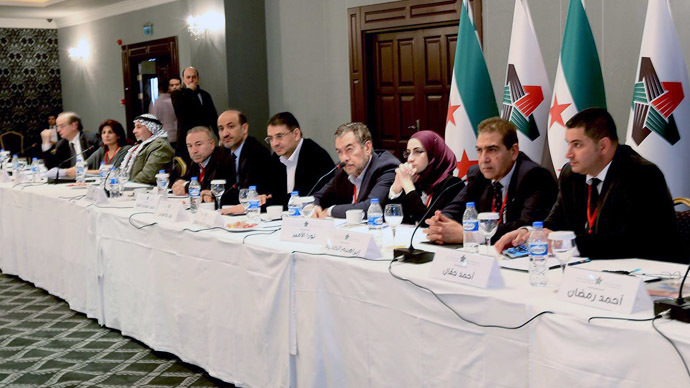

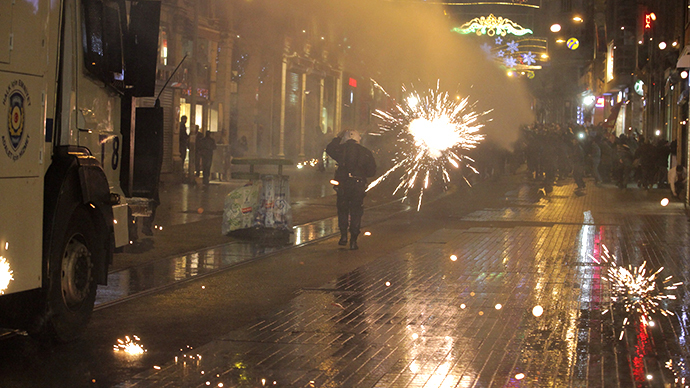




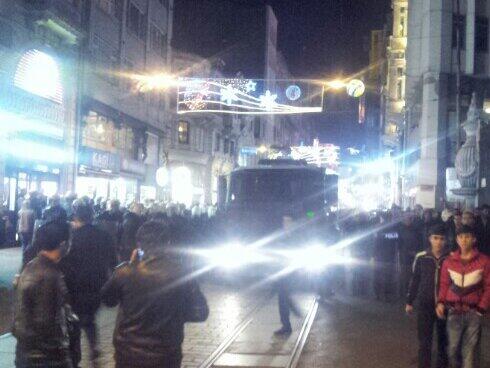

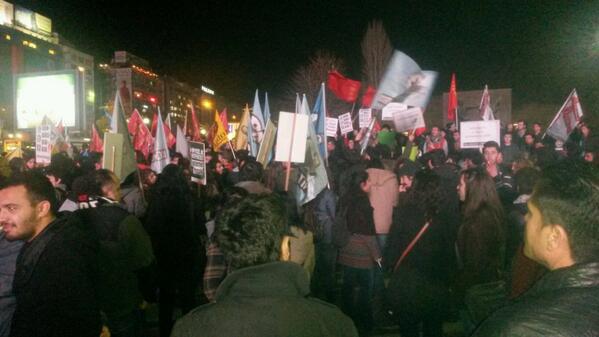


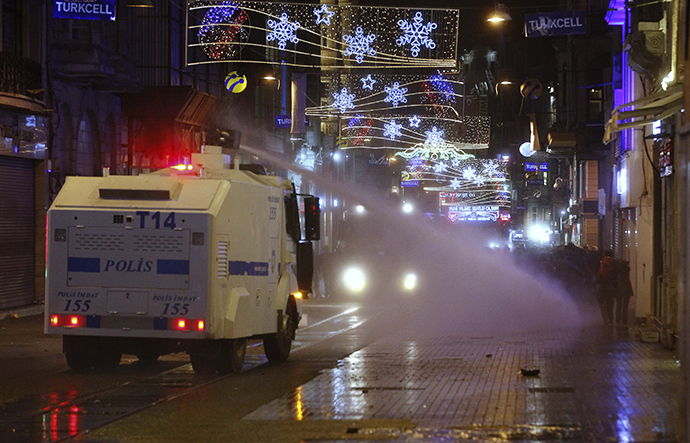
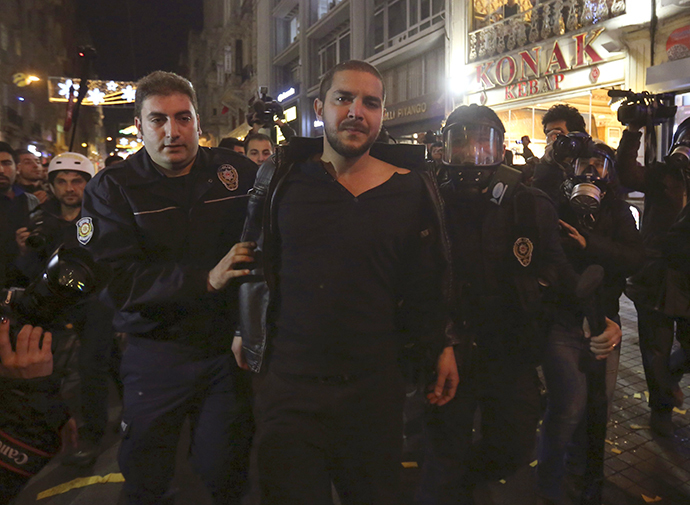
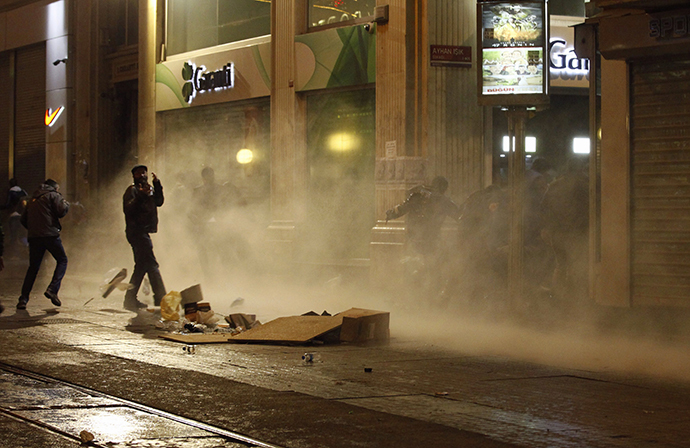

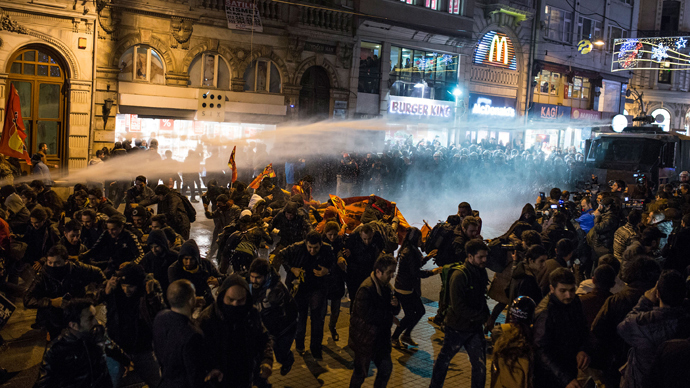

No comments:
Post a Comment